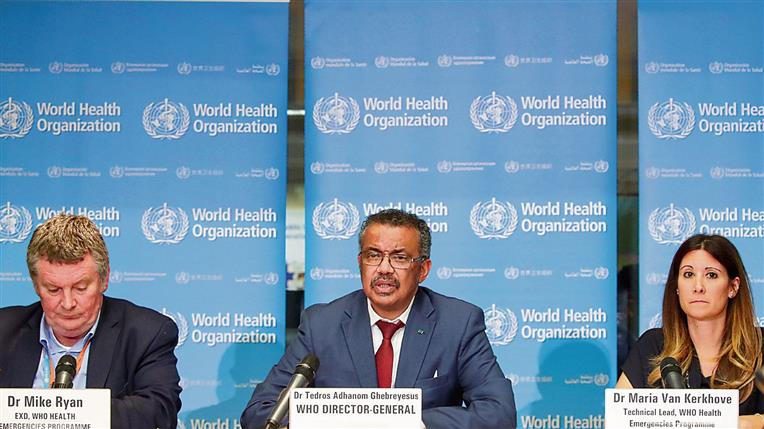
Under fire: The WHO faced criticism for not promptly forewarning about the coronavirus, but timely assessment may be difficult for entities in inter-governmental realm.
Luv Puri
Luv Puri
Journalist and Author
Ever since World War II, there is hardly an issue that has united every nook and corner of the global community with as much urgency and fear as the coronavirus disease (Covid-19) that has caused the lockdown of one global city after another. The loss is colossal, both in terms of human and economic impacts.
Combating the Covid-19 spread is testing the national health system capacities globally, both qualitatively and quantitatively. It is also the test of each country’s governance structures and social capital. Understandably, due to the wide spread of Covid-19 and the inter-connected nature of the world today, the pandemic has given a thrust to the voices vying for a greater role for the multilateral institutions to combat these types of pandemics in future.
There is hardly any doubt that such a global crisis should have been a classic opportunity for the United Nations, particularly its specialised agency, World Health Organisation (WHO), to rise to the occasion and support national efforts in combating the spread of Covid-19 by advance warning and facilitating the sharing of best practices among the member states.
However, at a practical level, one needs to inject a degree of realism by understanding the granular nuances relating to the broad structural realities in which the multilateral institutions and their workforce exist.
In the last three months, we have seen that the member-states had little clue about the impending crisis in the weeks or months to come as Covid-19 spread from China to the other parts of the world exponentially. The WHO characterised Covid-19 as a pandemic on March 11, which was preceded by a report of the WHO-China
Joint Mission on Coronavirus Disease-2019 from February 16 to 24 this year. The 40-page report had detailed recommendations for China and the international community, both impacted and uninfected.
One of the recommendations for the international community was to ‘rapidly share information as required under the International Health Regulations (IHR), including detailed information about imported cases to facilitate contact tracing and inform containment measures that span countries.’
On March 16, the WHO representative in China complimented China and said that ‘it is an epidemic that has been nipped as it was growing and stopped in its tracks. This is very clear from the data that we have, as well as the observations that we can see in society in general.’
The fact is that China arrested the rise in domestic cases of Covid-19 only around the third week of March, after the death of over 3,000 lives. In fact, it is strongly believed that early warning signs about the scale of the impending crisis could not be acted upon by the authorities and a cover-up was carried out. Li Wenliang, an ophthalmologist at Wuhan Central Hospital, had shared the information about the ‘SARS-like coronavirus’ within his medical ecosystem in December 2019, but he was reportedly silenced by the local police with a stern warning not to spread rumours. He later died of the virus.
In this context, the WHO is facing flak from several quarters for not promptly forewarning the international community about the impending dangers of the virus. On March 26, speaking to reporters, President Trump noted that ‘the WHO has very very much sided with China. A lot of people are not happy about it...I think there is certainly a lot of talk that it’s been very unfair. I think that a lot of people feel that it’s been very unfair.’
With a budget of approximately $4.2 billion for the period 2019-23, one of the elements of the WHO mandate in the context of health emergencies is to prepare for exigencies by identifying, mitigating and managing risks, preventing emergencies and supporting the development of tools necessary during the outbreaks.
However, to pin the entire blame on the WHO leadership in failing the international community will not be appropriate. It will be altogether missing out on the complex big picture and granular organisational nuances. The multilateral entities work in the inter-governmental realm and it is hard for any entity to make bold and objective timely assessments that may earn the wrath of member-states, particularly the influential ones in the international system.
Also, the work of these entities depends on the cooperation of the relevant member-state as they need access in the first place to assess and make objective recommendations.
Moreover, the concept of a career in international civil service in multilateral entities remains an idea good on paper. In many UN entities, including the WHO, the hiring mechanism for staff members resembles a gig economy as the issuance of short-term temporary contracts with curtailed benefits is common. The retention of many staff members hinges on voluntary contributions of member-states as the proportion of annual mandatory funding portion of member-states is reduced. The result is progressively increasing all-round institutional mess, with limited accumulation of institutional knowledge, which is particularly important in a crisis.
The present crisis is a humbling moment for those invested in multilateralism. The onus is on member- states and other relevant stakeholders to improve the health of multilateral institutions. In this context, at least critical and specialised UN entities should be able to attract and retain qualitative domain expertise. Nurturing institutional knowledge becomes critical in this respect. The main players of the international system should give these entities space and freedom to put forward their assessments objectively without fear.
The pandemic that has impacted China, Europe, the United States and may possibly grip other parts of the world has taught us that the success of multilateral institutions is not a favour to any particular region, but a global win-win situation.
Join Whatsapp Channel of The Tribune for latest updates.




























